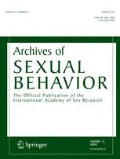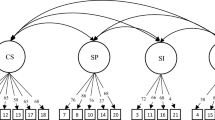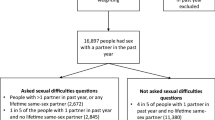Abstract
Effects of mode of assessment, person, and situational variables on the accuracy of self-reports of sexual behavior remain uncertain. To evaluate these influences, 190 young women completed measures of erotophilia and social desirability and then monitored their health-related behaviors with a diary for 8 weeks. They returned on two occasions to complete either a face-to-face interview (FTFI) or a self-administered questionnaire (SAQ) regarding their behavior over the same interval. To check the apparent accuracy of participants' retrospective self-reports, a difference score was calculated by subtracting responses obtained on the FTFI or SAQ from the diary card. Results indicated that both modes of assessment were reliable; reliability did not differ as a function of mode of assessment. However, SAQs elicited less discrepant responses for protected vaginal sex; SAQ and FTFI reports for unprotected sexual behaviors were equivalent. Situational and person variables did not predict accuracy scores, which were impaired at higher frequencies of behavior. Results suggest that both modes of assessment were reliable and SAQs may be more accurate for some sexual behaviors.
Similar content being viewed by others
REFERENCES
Boekeloo, B. O., Schiavo, L., Rabin, D. L., Conlon, R. T., Jordan, C. S., and Mundt, D. J. (1994). Self-reports of HIV risk factors by patients at a sexually transmitted disease clinic: Audio vs. written questionnaires. Am. J. Pub. Health 84: 754–760.
Bradburn, N., and Sudman, S. (1979). Improving Interview Method and Questionnaire Design. Washington, DC: Jossey Bass.
Carey, M. P., Braaten, L. S., Maisto, S. A., Gleason, J. R., Forsyth, A. D., Durant, L. E., and Jaworski, B. C. (2000). Using information, motivational enhancement, and skills training to reduce the risk of HIV infection for low-income urban women: A second randomized clinical trial. Health Psychol. 19: 3–11.
Catania, J. A. (1999). A framework of conceptualizing reporting bias and its antecedents in interviews assessing human sexuality. J. Sex Res. 36: 25–38.
Catania, J. A., McDermott, L. J., and Pollack, L. M. (1986). Questionnaire response bias and face-to face interview sample bias in sexuality research. J. Sex Res. 22: 52–72.
Crowne, D. P., and Marlowe, D. (1964). The Approval Motive: Studies in Evaluative Dependence. New York: Wiley.
Czaja, R. (1987). Asking sensitive behavioral questions in telephone interviews. Int. Q. Comm. Hlth. Ed. 8: 23–32.
Downey, L., Ryan, R., Roffman, R., and Kulich, M. (1995). How could I forget? Inaccurate memories of sexually intimate moments. J. Sex Res. 32: 177–191.
Efron, B., and Tibshirani, R. J. (1993). An Introduction to the Bootstrap. New York: Chapman & Hall.
Fisher, W. A., Byrne, D., White, L. A., and Kelley, K. (1988). Erotophobia–erotophilia as a dimension of personality. J. Sex Res. 25: 123–151.
Gardner, W., Mulvey, E. P., and Shaw, E. C. (1995). Regression analyses of counts and rates: Poisson, over dispersed poisson, and negative binomial models. Psychol. Bull. 118: 392–404.
Kalichman, S. C., Kelly, J. A., and Stevenson, L. Y. (1997). Priming effects of HIV risk assessments on related perceptions and behavior: An experimental field study. AIDS Behav. 1: 3–8.
Lunneborg, C. E. (1985). Estimating the correlation coefficient: The bootstrap approach. Psychol. Bull. 98: 209–215.
McFall, R. M. (1970). Effects of self-monitoring on normal smoking behavior. J. Consult. Clin. Psych. 35: 135–142.
McLaws, M., Oldenburg, B., Ross, M.W., and Cooper, D. A. (1990). Sexual behaviour in AIDS-related research: Reliability and validity of recall and diary measures. J. Sex Res. 27: 265–281.
Miller, H. G., Turner, C. F., and Moses, L. E. (1990). Methodological issues in AIDS surveys. In Miller, H. G., Turner, C. F., and Moses, L. E. (eds.), AIDS: The Second Decade.Washington, DC: National Academy Press.
Reading, A. E. (1983). A comparison of the accuracy and reactivity of methods of monitoring male sexual behavior. J. Behav. Assess. 5: 11–23.
Strecher, V. J., Becker, M. H., Clark, N. M., and Prasada-Rao, P. (1989). Using patients' descriptions of alcohol consumption, diet, medication compliance, and cigarette smoking: The validity of self-reports in research and practice. J. Gen. Intern. Med. 4: 160–166.
Tourangeau, R., and Smith, T. W. (1996). Asking sensitive questions: The impact of data collection mode, question format, and question context. Publ. Opin. Q. 60: 275–304.
Webb, G. R., Redman, S., Gibberd, R.W., and Sanson-Fisher, R.W. (1991). The reliability and stability of a quantity-frequency method and a diary method of measuring alcohol consumption. Drug. Alcohol. Depend. 27: 223–231.
Weinhardt, L. S., Carey, M. P., Maisto, S. A., Carey, K. B., Cohen, M. M., and Wickramasinghe, S. M. (1998). Reliability of the timeline followback sexual behavior interview. Ann. Behav. Med. 20: 25–30.
Weinhardt, L. S., Forsyth, A. D., Carey, M. P., Jaworski, B. A., and Durant, L. E. (1998). Reliability and validity of self-report measures of HIV-related sexual behavior: Progress since 1990 and recommendations for research and practice. Arch. Sex Behav. 27: 155–180.
Author information
Authors and Affiliations
Rights and permissions
About this article
Cite this article
Durant, L.E., Carey, M.P. Self-Administered Questionnaires versus Face-to-Face Interviews in Assessing Sexual Behavior in Young Women. Arch Sex Behav 29, 309–322 (2000). https://doi.org/10.1023/A:1001930202526
Issue Date:
DOI: https://doi.org/10.1023/A:1001930202526




